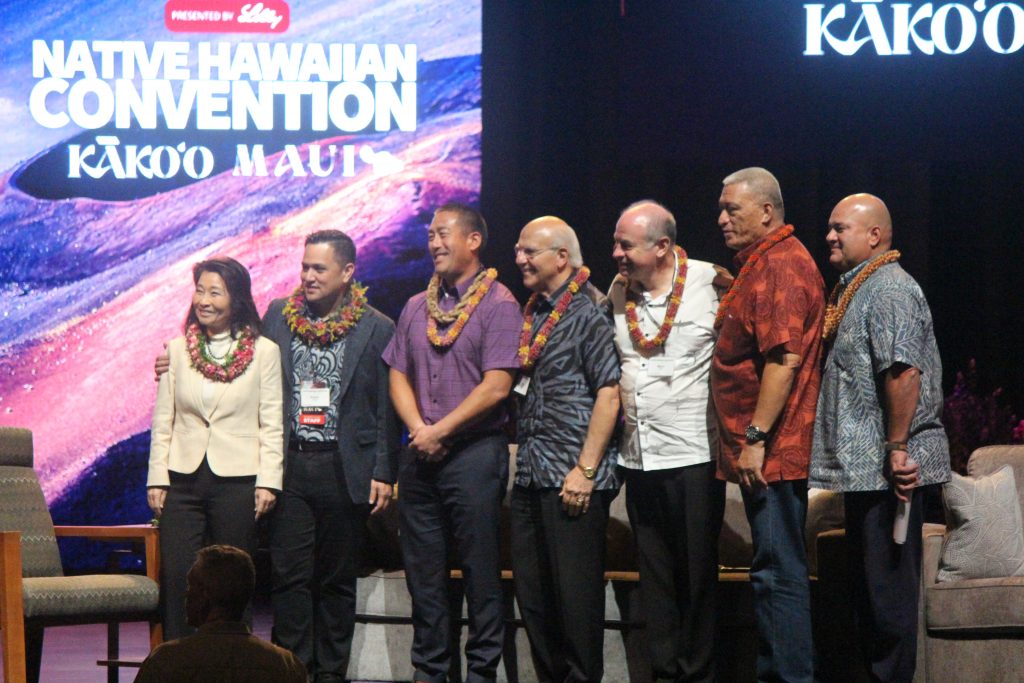Hawaiʻi’s mayors discuss housing after fires, Bissen calls for ‘voluntary compliance’

The four county mayors discussed a commitment to housing with affordable housing solutions and plans toward a sustainable future. It was part of a panel discussion at the 22nd Annual Native Hawaiian Convention held on Maui this week.
Maui Mayor Richard Bissen acknowledged: “Housing was an issue on Maui and in West Maui before Aug. 8, and it became, obviously, a bigger issue after that.”
He said that while Maui has lots of housing inventory, the challenge is space, infrastructure and cost. “People talk about building things, putting up tiny homes… The problem is where we put them, where do we find the water to steward, and the infrastructure is one of the barriers to our housing… If we’re going to build new housing, then we need to face those challenges.”

“We have issues of private ownership—people who have private ownership of homes, private water systems that people develop. So yes, there are things that government can do, for sure. Government can take from one and give to another. Government can do that. But, you get all the challenges that come with that as well, and that’s what we’ve been working on.”
-Mayor Richard Bissen
According to Mayor Bissen, the County of Maui is seeking is “voluntary compliance” from the industry to donate rooms or homes to address needs following the fires.
“That’s the first thing is to ask: ‘Can you turn your units into that?’ If they say ‘no,’ then we have the option that has been talked about. It’s not that we don’t understand the option or we’re not aware of the option, the question is, when do you make that call,” said Mayor Bissen.
“There’s a saying: ‘You don’t give credit to the one who predicts the storm or the flood. You give credit to the one who builds the arc.’ We need to be in the arc-building phase now… The problem is understood. The challenges are understood. There’s different ways to do this.”
-Mayor Richard Bissen
His words struck a chord with organizers from the Lahaina Strong coalition, who have been asking for dignified interim housing for fire survivors. It was among the core demands laid out by the Lahaina Strong Hui during a “Fish-in for Housing” which launched in Kāʻanapali last Friday.
The hui is asking for the use of existing housing stock to accomplish this goal.
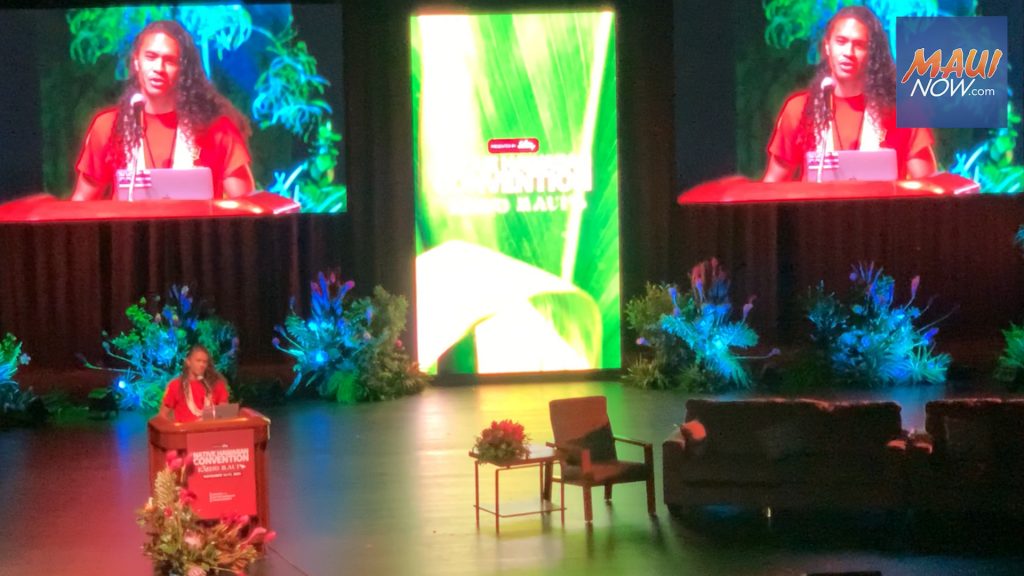
“Mayor Bissen’s words are a major victory that show both that he is willing to listen to community, and the power of our community coming together as one to make our demands for dignity heard,” said Lahaina Strong advocacy and communications coordinator Paele Kiakona in an organization press release. “Now, with the holidays approaching, we need Mayor Bissen to act on those words and translate them into action by delivering a pathway to housing security and peace of mind for our people.”
Mayor Bissen identified cost as a concern saying, “We recognize that we have inventory on Maui. This is what I was starting to say about those tiny homes that people want to offer us, and where to put them. Just slap them up because people will take them? There are folks that are interested in that by they way, I acknowledge that.”
“It’s not that we don’t have enough homes, it’s that we don’t have enough money to pay for those particular homes. So that’s correct… If money was not an object, we could buy all the second homes or short term homes or pay for those costs. That’s what we are talking about—getting funding from the federal government, the state, private philanthropy.”
-Mayor Richard Bissen
“We have plenty homes—plenty empty homes on Maui,” said Mayor Bissen. “We want people to be where they are from. We don’t want people selling their lands. We don’t want people selling their homes. We don’t want people giving in to opportunists that will try to capitalize on what’s happening to our community, and people who want to take the first thing that’s offered to them without knowing the other [options],” said Mayor Bissen.
CNHA Director of Data and Technology Matt Jachowski gave a presentation on housing prior to the mayors’ panel discussion. “On Maui there’s only one answer—our long term rental supply is tapped out. With over 3,500 displaced families in need of housing stability, our only option is to convert just 15% of Maui’s more than 24,000 short-term rentals and second homes into long-term rentals, at least for the next few years until more housing is built,” he said.
“Our duty as government is to present the other options that people have. Let’s talk of creating a land trust,” said the mayor. That was one of the topics that was also explored at the Native Hawaiian Convention.
“There’s issues of people’s insurance, not having enough insurance, being underinsured, being uninsured. There are so many other topics that come out of this discussion that has to do with long-term where these people end up. Right now we’re dealing with the interim period. Short term is the emergency housing—people that were in hotels,” said Mayor Bissen.

As other mayors offered both their help and ideas, Mayor Bissen took the opportunity to thank them for being with Maui in its time of need and going forward.
“These are the first four people who called me, individually,” said Mayor Bissen in reflecting on the Aug. 8 wildfires. “They were also the first to send help,” he said. “By the next day they were sending their staff—whether it was firefighters, police officers, people working for the Emergency Operations Center.”
Micah A. Kāne is the CEO and President of the Hawai’i Community Foundation served as moderator for the panel. He had called Mayor Bissen on the night of the fires to tell him that the Maui Strong Fund had already been set up.
“They had the foresight to already have this fund in place and as you know by now, there’s over $150 million dollars that has been donated. It was set up immediately for us,” said Mayor Bissen.
“I really think with all of the tools that we have—whether it’s federal money, tax credits, all the boring stuff—our tool box have a lot of tools. But to me, the biggest component is you’re going to need to have elected officials and leaders that are willing to lose friends along the way, quite honestly,” said Kauaʻi County Mayor Derek Kawakami.
“To make it very simple, change is often the most challenging thing for people to embrace, but that’s the only constant thing in life,” said Kawakami.
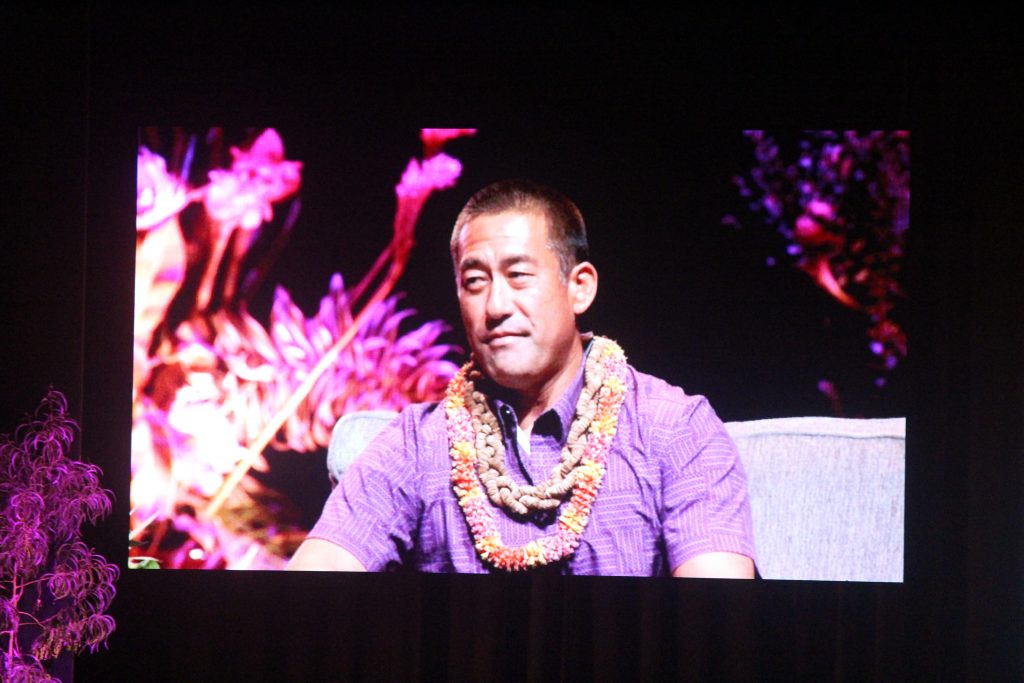
“Although a majority of our people understand that we need housing, it’s hard for them to embrace that change if the change is happening in their back yard. Until you get leaders that are at peace with for the greater good, losing people along the way, we will continue to be in a whirlpool of stagnation and trying to do the same things over and over again.”
-Kaua’i Mayor Derek Kawakami
Honolulu City and County Mayor Rick Blangiardi discussed the difficulties with rail and ultimately creating a corridor for housing. He said, “As difficult as rail was, it doesn’t compare to the challenge of rebuilding Lahaina is going to be.”
When the fires happened, the state opened up the Hawaiʻi Convention Center on Oʻahu in preparation for an influx of people seeking respite and shelter. “We ended up having to close the convention center and we never got that group of people… People stayed on island. If that doesn’t speak to an incredible, intense love of place, I don’t know what does. When you have that as a foundation, nothing can stop you going forward,” said Mayor Blangiardi.
“I’m anxious to see what gets created here, knowing it will be very meaningful for this island and for its people,” he said.
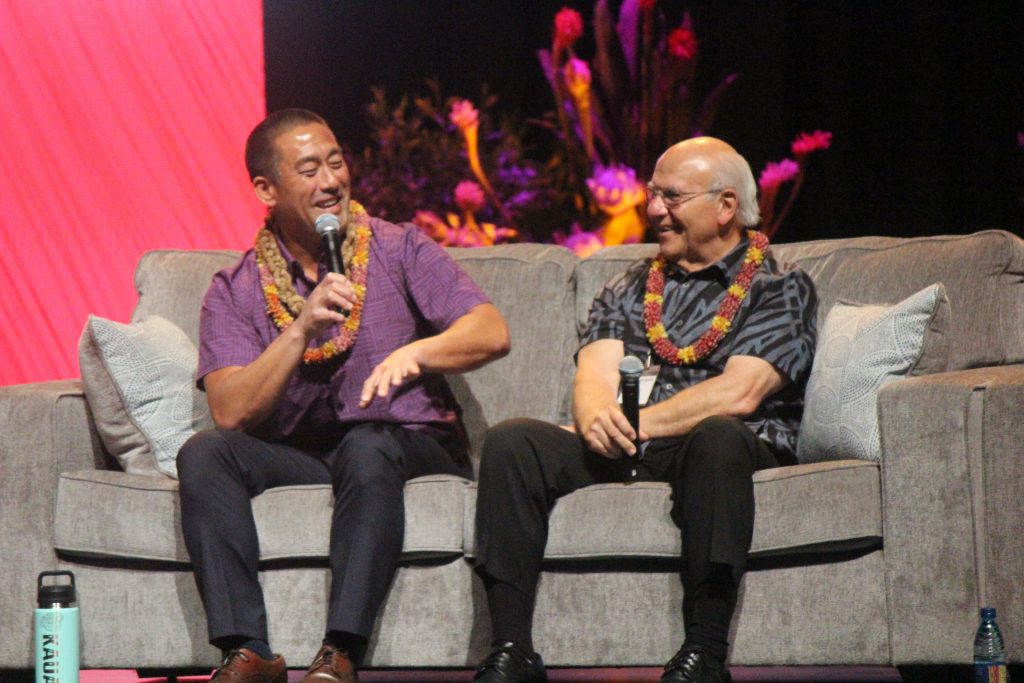
“I think there’s so many times we get stuck on what we don’t want and we start focusing on that,” said Hawai’i County Mayor Mitch Roth, who has turned his focus to sustainability.
“Really what it means to me is that ability to allow our keiki to raise their keiki in Hawaiʻi. And it doesn’t matter if you are not in favor of something. Generally most people can get around and say, ‘yeah, that is something that I do want…’ The number one way you make that happen is housing—and not just any housing, but housing for our local people.
-Hawaiʻi County Mayor Mitch Roth
“When you’re intentional in that way, you’re able to make things happen,” said Mayor Roth. “We came in and saw that in our pipeline we had about 1,200 homes in our pipeline, and we knew right from the get-go, we needed to get to 10,000 before 2025. So we started to look at how to make that happen,” he said.
“Often times, government is looked at as ‘how you regulate things.’ We have to change that philosophy from government from being regulators to being facilitators and making it happen, getting together with people that can make it happen,” said Mayor Roth.
In doing so, he said Hawaiʻi County has gone from having 1,200 homes in the pipeline to a little over 6600 in the pipeline going forward.
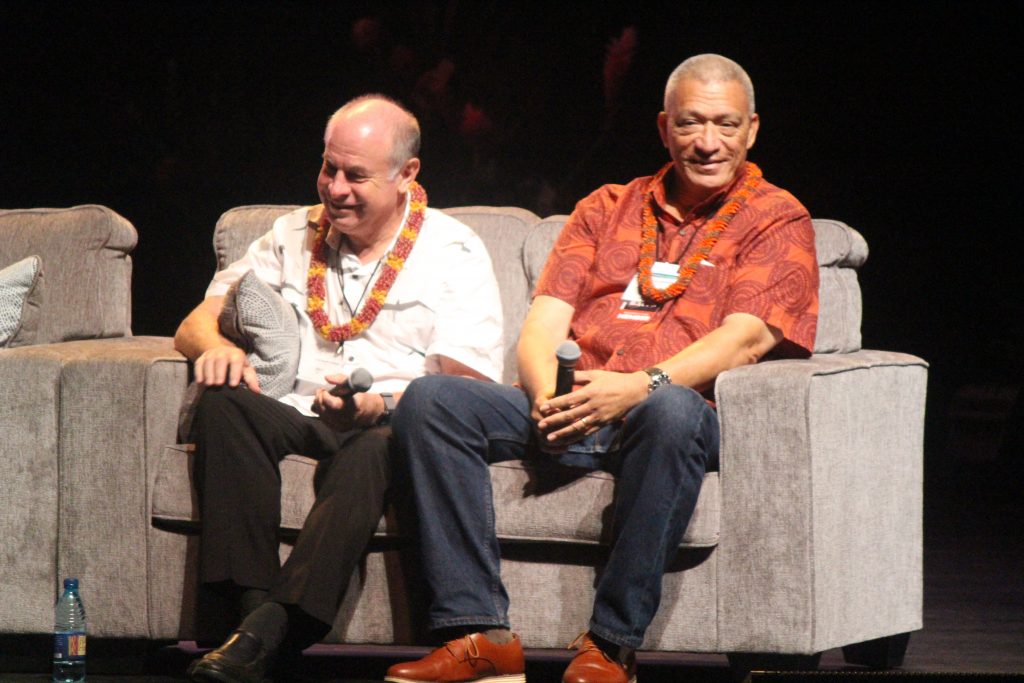
“If weʻre going to solve these problems, we’re going to solve them working together,” said Mayor Roth. “What I know with the people of Hawaiʻi—because of the aloha that we all have for each other… I think there’s a lot of possibilities as Maui rebuilds… I have a lot of hope because what I’ve seen is the people of Maui are able to tap into that super power of alpha.”
“One of the challenges we all face in government especially is you make a group decision that affects people individually. We don’t make a thousand individual decisions with folks. We make a decision that is going to affect the whole group, but depending on where you are, it’s going to impact you differently,” said Mayor Bissen.
“We’re mindful of that, and our goal for this administration during this response and recovery time is to do everything we can to give the safe, stable, secure housing for our folks that are not in that way right now—dealing with uncertainty and instability. So our goal is to get to them as safe and secure housing as we can, as soon as we can,” said Mayor Bissen.
“Everything that we can possibly think of can happen, that we can make happen, is what’s being pursued. I know we can do a better job of making that known to you. That’s the feedback we get—to message that more, so you can be comfortable knowing that that’s happening. That’s a commitment,” said Mayor Bissen.
“I do appreciate everyone’s patience and tolerance with what’s been happening and that’s our commitment to you,” he said.
